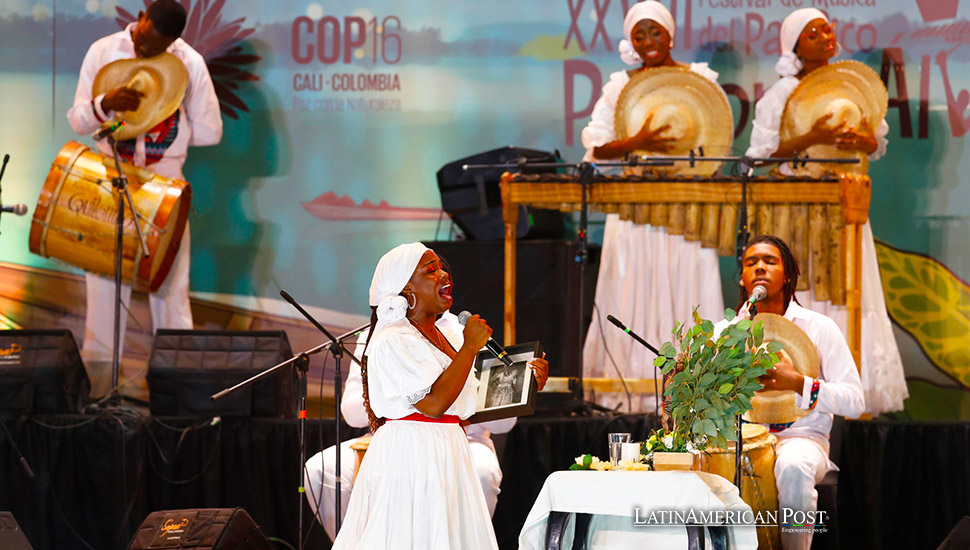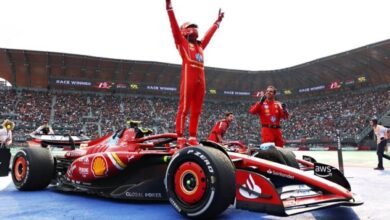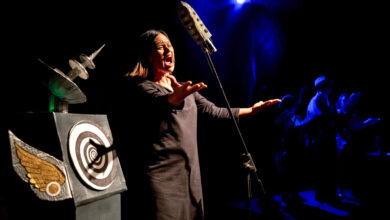Petronio Álvarez Festival Elevates Afro-Colombian Music to Global Stage

The Petronio Álvarez Festival in Cali, Colombia, is more than just a celebration of Afro-Colombian music; it’s a cultural movement capturing international attention. With notable visitors like Prince Harry and Meghan Markle, the festival propels this rich musical tradition onto the global stage.
The Petronio Álvarez Festival has grown from a local celebration into a global phenomenon in the heart of Cali, Colombia. This iconic festival, named after the revered Afro-Colombian musician Petronio Álvarez, showcases the rich musical heritage of Colombia’s Pacific coast. As the festival concluded its 28th edition, it was clear that it was no longer just a local affair—it was a beacon for Afro-Colombian culture, drawing attention from around the world.
The festival’s growing international profile was evident this year when Prince Harry and Meghan Markle attended as guests of Colombia’s Vice President Francia Márquez, the first Black woman to hold this position in the country. Their presence highlighted the festival’s significance as a cultural event and a platform for social and political dialogue. Markle’s speech, delivered in flawless Spanish, and the couple’s participation in the festivities underscored the global appeal of Afro-Colombian music and culture.
Overcoming Obstacles to Celebrate Culture
The Petronio Álvarez Festival is rooted in the rich musical traditions of Colombia’s Pacific coast, a region historically marginalized yet culturally vibrant. On the festival’s Saturday night, the sound system failed during La Herencia de Timbiquí’s performance, but the estimated 45,000 attendees didn’t miss a beat. They continued singing, demonstrating the deep connection between the music and the people. This moment of collective resilience reflects the spirit of the festival—a celebration of cultural pride that thrives despite challenges.
La Herencia de Timbiquí, one of the festival’s standout acts, exemplifies the growing global interest in Afro-Colombian music. With millions of streams on platforms like Spotify, the band represents a bridge between the traditional sounds of the Pacific coast and a global audience. However, despite the increasing global influence of Latin music, the diverse genres of Afro-Colombian music, such as chirimía and curricular, remain relatively underrepresented on the international stage. The Petronio Álvarez Festival is changing that, one performance at a time.
The Roots and Rise of Petronio Álvarez Festival
The Petronio Álvarez Festival is named after Petronio Álvarez, a railway worker and composer whose song “Mi Buenaventura” became an anthem for the region. Since its inception in 1997, the festival has grown exponentially. What started with just 5,000 local attendees has blossomed into an event that the Cali government estimates could attract up to half a million in 2024. The festival’s growth reflects the increasing appreciation for Afro-Colombian music and the broader recognition of Colombia’s cultural diversity.
Cali, the festival’s host city, is home to the second-largest Black population in Latin America after Bahia, Brazil. Many of Cali’s Black residents migrated from the Pacific coast, bringing a rich cultural heritage that includes music genres steeped in folklore. These genres, however, have long been overshadowed by more commercially successful Colombian music styles such as vallenato, cumbia, and reggaeton. The Petronio Álvarez Festival aims to elevate these lesser-known genres, giving them the platform they deserve.
Global Attention and the Role of Influential Figures
The presence of Prince Harry and Meghan Markle at the festival brought unprecedented global attention to the event. The royal couple’s participation, particularly Meghan’s speech in Spanish, resonated with the festival’s mission to amplify marginalized voices and cultures. Their involvement also highlights a growing global awareness of Afro-Latin music and its potential to connect people across cultures.
This kind of international recognition is vital for the continued growth of the Petronio Álvarez Festival. It raises awareness of Afro-Colombian music and draws attention to the social and economic challenges faced by the Pacific Coast’s communities. The festival’s ability to attract high-profile visitors underscores its importance as a cultural and political platform.
Similar Festivals Amplifying Afro-Latin Music IN Latin America
The Petronio Álvarez Festival is part of a broader movement across Latin America to celebrate and preserve Afro-Latin music. Similar regional festivals are working towards the same goal, each adding its unique voice to the cultural landscape.
In Brazil, the state of Bahia, known for its rich Afro-Brazilian culture, hosts several festivals celebrating African heritage, including the Carnival of Salvador, featuring Afro-Brazilian music and dance. Bahia’s carnival is the largest in Brazil, showcasing genres such as samba-reggae and axé music, which have deep roots in African traditions.
In Cuba, the Festival del Caribe, also known as the Fiesta del Fuego, takes place in Santiago de Cuba. This festival celebrates the African and Caribbean cultural heritage with music, dance, and religious ceremonies. It’s a vibrant display of the region’s cultural diversity, highlighting the African influences that have shaped Cuban music genres like rumba and son.
The Festival de San Juan Bautista in Venezuela, held in towns such as Curiepe, celebrates Afro-Venezuelan music and culture. This festival, which features the rhythmic beats of traditional drums and dance, honors the African roots of Venezuelan culture and its enduring influence on the nation’s identity.
Like the Petronio Álvarez Festival, these festivals are vital platforms for promoting Afro-Latin music and culture globally. They preserve traditional music and foster innovation, allowing these genres to evolve and reach new audiences.
The Future of Afro-Colombian Music
The Petronio Álvarez Festival’s growing international recognition is a testament to the global appeal of Afro-Colombian music. As the festival continues to attract a diverse audience, including influential figures like Prince Harry and Meghan Markle, it’s clear that the world is beginning to take notice of this rich cultural tradition.
The festival’s success also reflects broader trends in the global music industry, where there is increasing interest in diverse and underrepresented genres. Platforms like Spotify have made it easier for artists worldwide to reach an international audience, and the Petronio Álvarez Festival is capitalizing on this opportunity. By showcasing the best of Afro-Colombian music, the festival is helping to bring this vibrant culture to the forefront of the global stage.
As the Petronio Álvarez Festival grows, it will likely inspire similar events in other parts of Latin America. These festivals celebrate Afro-Latin music and serve as vital social and political discourse platforms. They highlight the struggles and triumphs of Afro-Latin communities, bringing their stories to a broader audience.
A Celebration of Culture and Resilience
The Petronio Álvarez Festival is more than just a music festival—it celebrates Afro-Colombian culture and resilience. Through music, dance, and community, the festival brings together people from all walks of life to honor the rich heritage of Colombia’s Pacific coast. As the festival continues to gain global recognition, it’s clear that Afro-Colombian music is poised to impact the world stage significantly.
Also read: Puerto Rico’s J-King and Maximan Reimagine Their Hits wiith Nostalgic Acoustic
With the support of international figures, the festival is preserving a cultural tradition and elevating it to new heights. The Petronio Álvarez Festival is a shining example of how music can transcend borders, bringing people together and fostering a deeper understanding of the world’s diverse cultures. As more people worldwide discover the beauty of Afro-Colombian music, the festival’s influence will only grow, paving the way for a new era of cultural exchange and appreciation.





